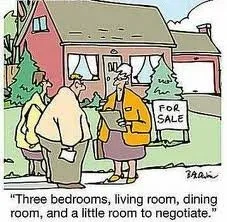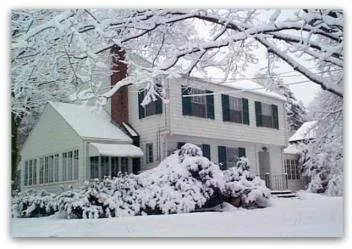Should you Make an Offer on an Overpriced Home?
If you are actively looking for a home, you've seen them. Probably a lot of them. Overpriced homes for sale. But what if you like that house? Will the seller ever negotiate to a reasonable price on that home you want to buy in Connecticut?
You won't know unless you have the right agent on your side, and unless you try. It's important to have a good understanding of the different types of seller motivations that influence listing prices and the amount of negotiations that seller is willing to consider, in order to arrive at the decision as to whether to place an offer on that particular house or not.
Sellers have their own pricing mentality, or level of motivation, that can pretty much be summed up into three categories:
CLEAR CHOICE SELLERS Have to or Must Sell – This homeowner absolutely must sell the home, and the asking price clearly reflects that. These homes are generally the best deals out there, and have an excellent chance to sell in any type of market. They attract more qualified and realistic buyers, and sell at higher list price to sale price ratios.
THE MAYBE SELLERS Should sell, but want top dollar – This homeowner does have a real need to sell, but has not priced the home correctly for one of many possible reasons. They may feel as if they have to "net" a certain amount, and can be stubborn about it, until enough time passes wher it becomes more urgent. They may also feel that they can test the market at a higher price to try and get more money, and gradually reduce it. They may also try and mask this to their own agent by insisting to put "negotiating room" in the listing price.
SLIM CHANCE SELLERS If I get my price, I'lll Sell – This type of homeowner doesn't really need to sell the home, but if they can get their price, they will. If not, they will just stay in their home, and not be too concerned about their house not selling. There is a strong probabilty that this type of homeowner will not sell their home in today’s market, so home buyers who actually view this type of property are just wasting time. This listing will most likely end up as an "Expired"
So how is a buyer to tell which type of seller is which?
Truly, that's your agents job.Your agent should have the skillsets to "read between the lines" of the listings that are most likely to interest you, and discuss whether the seller appears motivated or not BEFORE you even go look at the house. That could be in the form of getting you prepared to make an offer on a house that looks like a great deal, or preparing you for a house that meets your needs and wants but is priced too high for the market.
Market time, showing availability and prior listing history on the house, including how many times it has been listed, what the price reductions were and when, and also public records search are all useful in determining seller urgency
I am always of a mind to try and negotiate with any type of seller, even if it's a "Slim Chance or a Maybe". Circumstances for that seller could have changed this morning or even yesterday, and that seller might be willing to listen to an offer today that they would not have even dreamed about considering just last week.
The Slim Chances and the Maybe's have egos to contend with, but we would be remiss if we didn't consider their agent's egos as well. So now we have yet another fly in the ointment that has to be handled delicately, if it's going to be at all effective.
I remember one particular negotiation that I knew would be a tough one based upon pricing and the agent's ego. It was an estate property, so the bottom line for the sellers was the money, period. I called a meeting with the sellers agent and sellers, and explained to the agent that we were bringing in an offer that was significantly less than the asking price, and I wanted the opportunity to present it in person, rather than the by the standard back and forth via phone or fax. He agreed.
We met at the house, and I came prepared with about an inch and a half of comparables, statistics, and the like- never once disparaging the listing agent for pricing the home so improperly. The sellers agreed that after going through all of my statistics that my pricing was correct. I took all of the heat off that agent for presenting what was considered a low offer, the agent was grateful for saving face, and we put the deal together. The sales price to list price ratio on that house was 71 percent. I'm proud of that, and that's not the only one. So it can be done. If it's the right mix, the right negotiations and the right house, it doesn't hurt to try. The right agent representing you doesn't hurt, either- and I just happen to know someone..... (me!)
If you have a question about buying or selling Real Estate in Fairfield County, and are in need of representation, I invite you to contact me, and if you have an idea for a topic that you would like to see on The CT Realty Blog, please include it in the "Post a Comment" section link below this post. We appreciate the feedback and look forward to providing you with the best real estate content, advice and service in Fairfield County, Connecticut.
Heating Systems
The heating system is used most during the winter so it’s a good idea to make sure that it works before it’s desperately needed. The following inspection and maintenance tips can be of some help to homeowners:
Test the furnace by raising the temperature on the thermostat. If it does not respond to the adjustment quickly it might be broken.
Replace the air filter if it’s dirty.
If the furnace is equipped with an oil or propane tank, the tank should be full.
Cooling Systems
Use a hose to remove leaves and other debris from the outdoor condensing unit, if the home is equipped with one. Protect the unit with a breathable waterproof cover to prevent rusting and freezing of its components.
Remove and store window air conditioners when they are no longer needed. Cold air can damage their components and enter the house through openings between the air conditioner and the windowpane.
Ceiling fans can be reversed in order to warm air trapped beneath the ceiling to recirculate. A fan has been reversed if it spins clockwise.
Chimneys and Fireplaces
The chimney should be inspected for nesting animals trying to escape the cold. Squirrels and raccoons have been known to enter chimneys for this reason.
The damper should open and close with ease. Smoke should rise up the chimney when the damper is open. If it doesn't, this means that there is an obstruction in the chimney that must be cleared before the fireplace can be used.
A chimney-cleaning service professional should clean the chimney if it has not been cleaned for several years.
The damper should be closed when the fireplace is not in use. An open damper might not be as obvious to the homeowner as an open window, but it can allow a significant amount of warm air to escape.
Glass doors can be installed in fireplaces and wood stoves to provide an extra layer of insulation.
Roofs
If debris is left in gutters, it can get wet and freeze, permitting the formation of ice dams that prevent water from draining. This added weight has the potential to cause damage to gutters. Also, trapped water in the gutter can enter the house and lead to the growth of mold. For these reasons, leaves, pine needles, and all other debris must be cleared from gutters. This can be done by hand or with a hose.
Missing shingles should be replaced.
Landscape
Patio furniture should be covered.
If there is a deck, it might need an extra coat of sealer.
Adequate winterization is especially crucial for homes that are left unoccupied during the winter. This sometimes happens when homeowners who own multiple properties leave one home vacant for months at a time while they occupy their summer homes. Foreclosed homes are sometimes left unoccupied, as well. The heat may be shut off in vacant homes in order to save money. Such homes must be winterized in order to prevent catastrophic building damage.
In addition to the information above, InterNACHI advises the following measures to prepare an unoccupied home for the winter:
Winterize toilets by emptying them completely. Antifreeze can be poured into toilets and other plumbing fixtures.
Winterize faucets by opening them and leaving them open.
Water tanks and pumps need to be drained completely.
Drain all water from indoor and outdoor plumbing.
Unplug all non-essential electrical appliances, especially the refrigerator. If no electrical appliances are needed, electricity can be shut off at the main breaker.
In summary, home winterization is a collection of preventative measures designed to protect homes against damage caused by cold temperatures. These measures should be performed in the fall, before it gets cold enough for damage to occur. Indoor plumbing is probably the most critical area to consider when preparing a home for winter, although other systems should not be ignored.
by Nick Gromicko, Rob London and Kenton Shepard
Nick Gromicko, FOUNDER. http://www.nachi.org
International Association of Certified Home Inspectors (InterNACHI) is the world's most elite, non-profit inspection association.
President, ComInspect, www.cominspect.com
Director, Master Inspector Certification Board, www.certifiedmasterinspector.org
Author, 15 books and Co-Host of http://www.NACHI.TV


